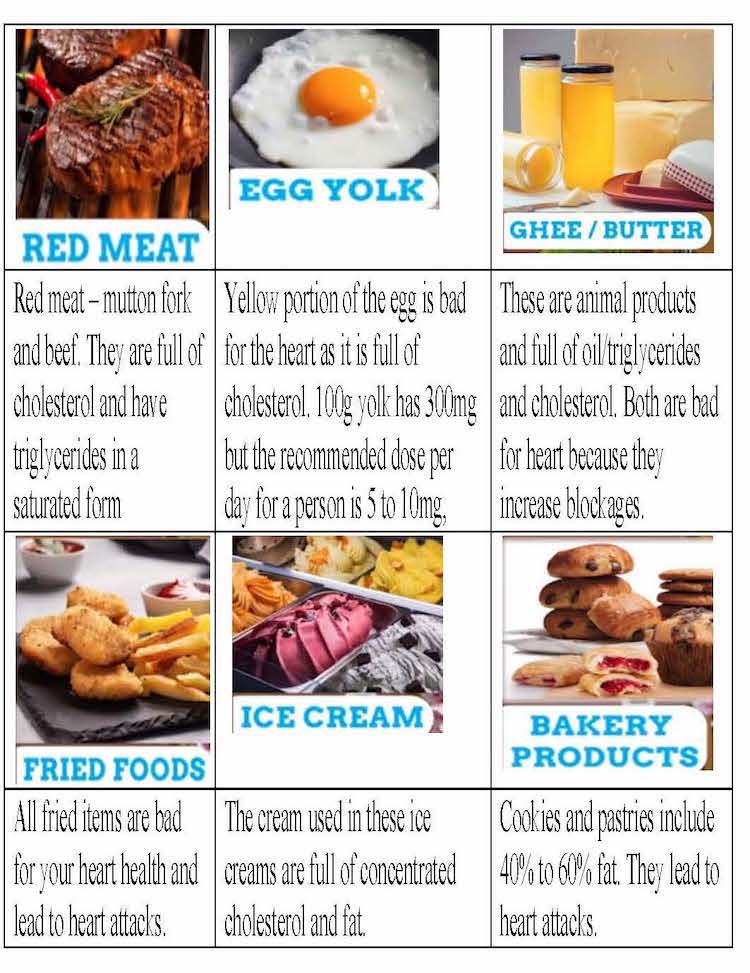
Archives
Contribute
| Common Harmful Foods For Heart Health |
Drs. Indrajeet Tyagi and Iranna Hirapur
07/31/2023
With the number of people suffering from heart-related issues, the common solution to heart issues is only through medical intervention. However, you can improve your heart health with a proper diet and a correct lifestyle. You can do that by knowing what foods to eliminate is also essential to keep your heart and health in good condition. If you do not consume a healthy diet, it can lead to heart disease because of plaque formation in the lining of arteries. The condition is called atherosclerosis, and it leads to blockage of blood flow in and out of the blood vessels. If this happens, enough blood does not reach all body parts and because of this, the oxygen supply gets disturbed, and breathing may become difficult. As a result, it can lead to severe health issues and even death. Therefore, proper dietary care for your heart health is necessary. What are the common foods associated with the risk of heart attack? Most risk factors for heart diseases are associated with the foods we eat. However, some of them can lead to several conditions that affect our heart health. Therefore, you should avoid some foods that contain high quantity oil to keep your heart healthy. 1. Walnut (Akhrot) - are not good for heat health since 100-gram walnuts contain 65-gram oil. 2. Almonds (Badam) - are full of triglycerides. A 100-gram almonds contain 58 to 60 gram oil 3. Shellfish and meat - Shellfish such as oysters, mussels, crab, lobster, and clams contain large amounts of cholesterol, particularly in relation to their serving size. For example, King crab legs contain 71 mg of cholesterol per serving, lobster contains 61 mg per serving, and oysters contain 58 mg per serving in spite of some useful chemical. Red meats (beef, pork and lamb) have more cholesterol and saturated (bad) fat than chicken, fish and vegetable proteins such as beans. Cholesterol and saturated fat can raise your blood cholesterol and make heart disease worse. 4. Chicken - consuming high levels of white poultry result in higher blood cholesterol levels than consuming an equal amount of plant protein. If you eat chicken as little as twice as week you could be at an increased risk of developing heart disease, say health professionals. 5. Avocado – Avocados have many calories (1 ounce/ 28 grams avocado has 50 calories). It is high in fat. However, its monounsaturated fat, which is a "good" fat that helps lower bad cholesterol, as long as you eat them in moderation. However, one of the recent studies showed that some people that have high levels of good cholesterol actually have a high risk of heart disease. 6. Salmon - Salmon is a fatty fish, and just like any other food, consuming too much of it can lead to weight gain and other health problems. 7. Olive Oil - olive oil does appear to cause relatively less damage than saturated animal fats, it is important to note that 'less damage' is still damage. The scientific evidence clearly shows that olive oil plays a role in both damaging blood vessels as well as forming atherosclerotic plaques. 8. Flaxseeds - contain 42% fat, with 1 tablespoon (10 grams) providing 4.3 grams and 37 calories although it is high in fiber and omega-3 fatty acids, as well as phytochemicals called lignans. Most studies show flax seeds do not lower triglyceride levels but may even raise them. Eating cheese, deep-fried foods, organ and processed meats, full-fat milk or yogurt, butter or ghee, fast foods (pizza, pasta, French fries, bread, white rice, canned soup, ranch dressing, ice-cream, potato chips etc.), desserts and bakery products or drinking too much alcohol or soda and being physically inactive, may increase blood triglycerides that are bad for your heart health. Using high amounts of salt, sugar, saturated fat, and refined carbs raise your risk for a heart attack or stroke. You need to avoid the foods that are rich in cholesterol and triglycerides. If not, then your body converts those calories it does not need to use right away into fat and are stored in your fat cells. When fats, cholesterols and other substances collect on the inner walls of the heart arteries. They buildup as plaque that cause the arteries to narrow, blocking blood flow that causes heart attacks.
by Drs. Indrajeet Tyagi and Iranna Hirapur
What are the six worst foods, which lead to heart attack?

You may also access this article through our web-site http://www.lokvani.com/



